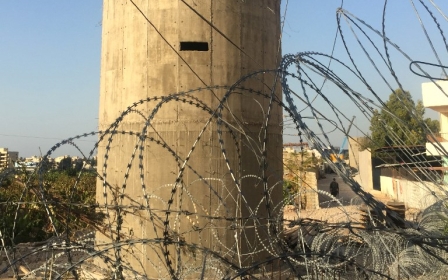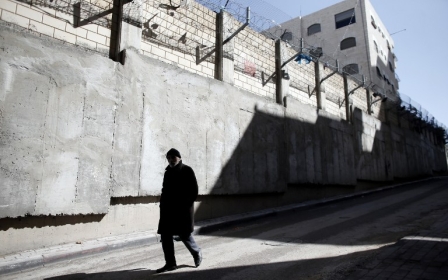Why Palestinian camp is protesting Lebanese 'wall of shame'

Abu Sherif Aqul sits back on the row of dark leather chairs, the table in front of him lined with neat glass bottles of pineapple juice. "The wall being built around Ain al-Hilweh is like the one built by the Israelis,” he says forcefully.
He insists relations with the national army are good - although that hasn't stopped the military privately voicing concerns about the group's activities in the past.
His enmity is directed toward the cement barrier, peppered with watchtowers, which the Lebanese Army began building in mid-November.
And his words matter: Abu Sherif is Usbat al-Ansar’s spokesman, a faction in the Palestinian refugee camp that the UK government considers a terrorist organisation trying to enforce its "extreme interpretation of Islamic law".
The sheikh is not the only one expressing anger and frustration among the camp’s 60,000 residents. Many thousands have protested, calling it the "wall of shame" and the “separation wall”, phrases that echo descriptions of the barrier that Israel built around the West Bank in 2000.
'It is like the Lebanese are against the Palestinians, or vice versa'
- Abu Sherif, Usbat al-Ansar’s
The Lebanese Army, which is funding the project, has halted construction, declaring that it will "wait and see.”
Meanwhile camp factions are contacting Palestinian Authority leader Mahmoud Abbas and international Palestinian groups to pressure the Lebanese government to stop the wall completely.
"It is like the Lebanese are against the Palestinians, or vice versa,” says Abu Sherif.
Two sides to every wall
The camp at Ain al Hilweh (the name translates as “sweet natural spring”) was built in south Lebanon in 1948 by the International Committee of the Red Cross to house civilians fleeing northern Palestine. The population swelled during the Lebanese Civil War between 1975 and 1990. It suffered heavy damage in the conflict’s later years, when much of its infrastructure was destroyed.
Only one kilometre square, the camp is the most populous in the country, home to more than 50,000 registered Palestinian refugees as well as at least 3,000 more Syrians who have fled the civil war. Including the immediate surrounds, the population is thought to be up to 100,000.
There is frequent gunfire. Armed men walk the same streets as children, who emerge from their nearby primary school
According to UNWRA, nearly half the residents are under 25. There are eight schools within the camp, but drop-out rates are high and employment opportunities few. Most residents with jobs work as casual labourers, builders, fruit-pickers or cleaners.
Access to Ain al Hilweh is currently through Lebanese Army checkpoints, where residents and visitors must show their ID and where vehicles must be searched.
Large signs forbid military personnel and foreigners entering without express permission. Once past the blockades – beyond which the military officially do not cross – visitors find walls plastered with yellow, black and white posters of Yasser Arafat and PLO leader Mahmoud Abbas. Offices dotted throughout the camp shelter men wearing flak jackets and fatigues and carrying AK47s.
The Lebanese Army has said that the wall is necessary to prevent such wanted militants moving in and out of the camp.
They insist it is part of the measures agreed to by the Palestinian Joint Security Forces, which is responsible for law enforcement within the camp and represents its 17 permitted factions.
But the Palestinians disagree.
Palestinian leaders 'had no idea' about wall
Propping a Marlboro Red on the rim of his ash tray, Brigadier Khaled Chayeb, security chief for the Palestinian Joint Security Forces, accepts that the idea of a wall had been around for a long time - but was still surprised when construction began.
"The Lebanese Army said political leaders [in the Palestinian factions] had been informed about it but they told me they had no idea.”
“There has to be a vow that the Palestinian forces will crack down on all aspects of security in the camp," it said. Its own residents have previously doubted the Joint Security Forces' ability to keep a lid on crime and violence.
But Chayeb would not be drawn on what, if any, the alternatives are.
"All the factions here co-operated with the Lebanese intelligence services on the same level," he insists.
And Abu Sherif insisted that the camp is one of the most secure in Lebanon, with a low crime rate in proportion to its population.
Factions are cooperating with Lebanese authorities, he explains, to encourage fugitives to hand themselves in. But he warns: "Forcing them to do so would lead to internal camp conflicts that would be bad for the whole population here."
'Even the wall will not guarantee security'
For the residents of Ain al-Hilweh, the wall may not be complete – but it still provokes anger, with protests taking place since construction began.
Mohammed Tohabiji, 22, says the wall project makes it feel "like we are now in a big prison” and serves "against the dignity of the camp".
UNRWA, the UN agency responsible for Palestinian aid, is waiting on further information about the wall before commenting publicly.
But a source, speaking on condition of anonymity to MEE, said Ain al-Hilweh residents wanted the organisation to take an official position on the project. “Some are even wondering if UNRWA is funding it - which of course we are not. This is not our business or mandate.”
Even if the wall is not finished, UNRWA feared that it would "stir old tensions" both between Palestinian factions and with the Lebanese Army, the source said: “That would affect our ability to deliver services to civilians in the camp, including vaccinations, sanitation and education."
Cheyab said Palestinian security forces were willing to work with the Lebanese Army as long as there were assurances that social and work opportunities for the community in Lebanon would improve.
'We insist upon decisions to improve the social situation for Palestinians. That means more job opportunities and citizens' rights'
- Khaled Chayeb, Palestinian Joint Security Forces
At present they have residency rights but are not granted full Lebanese passports, are barred from scores of professions, and cannot register for property or companies in their name.
“We are not against the Lebanese Army - they are trying to protect us,” says Cheyab. “But as well as decisions on security, we insist upon decisions to improve the social situation for Palestinians. That means more job opportunities and citizens' rights."
Meanwhile, Mohammed will continue his peaceful protest: plans are already taking shape for a sit-in outside the camp, in Saida.
"Even the wall will not guarantee security,” he says. “Lots of people have already tried to travel abroad because of the situation in the camp and this wall will make things worse."
Editor’s Note: For security reasons the reporter was chaperoned inside the camp and not allowed to roam inside independently.
Stay informed with MEE's newsletters
Sign up to get the latest alerts, insights and analysis, starting with Turkey Unpacked
Middle East Eye delivers independent and unrivalled coverage and analysis of the Middle East, North Africa and beyond. To learn more about republishing this content and the associated fees, please fill out this form. More about MEE can be found here.








